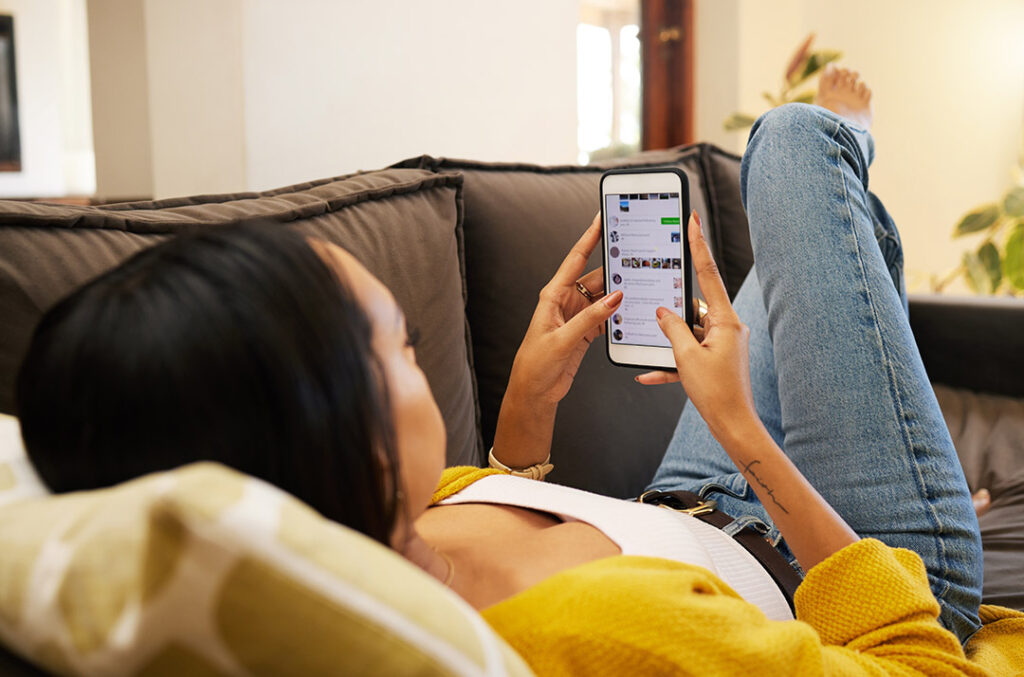Discover the many benefits of reducing screen time and learn practical tips on how to reduce screen time in your daily routine for better health and well-being.
Have you ever found yourself mindlessly scrolling through social media, only to realize hours have slipped away? Or maybe you’ve felt the familiar twinge of eye strain after a long day of staring at your computer?
You certainly aren’t alone! It’s no secret that screens have become an integral part of our daily lives. Whether it’s for work, school, socializing, or entertainment, we rely on our digital devices more than ever. And while technology undoubtedly offers convenience and connectivity, it also poses some challenges, especially when it comes to our health and well-being.
The good news is you don’t have to give up your screens entirely – simply reducing your daily screen time can have tons of benefits.
What is Screen Time?

Screen time is the amount of time you spend using any kind of device with a screen, like smartphones, tablets, computers, and televisions. While work and school can account for a lot of our screen time, other habits like scrolling social media, online shopping, watching TV, gaming, texting, and video calls also account for a big portion of our screen time.
While screen time itself can cause issues (like poor sleep or eye strain), it can also keep you from doing other things that benefit your health. Time spent in front of a screen could be time spent being physically active, socializing in person, or even getting some much-needed rest. Too much screen time often means lots of indoor time, and less exposure to fresh air and sunlight, nature, and physical activity.
Why Parents and Adults Should Limit Screen Use

If you’re a parent, you’re probably concerned about how much screen time your kids are getting. While our devices are great for keeping kids entertained and can even help them learn, too much screen time can be harmful.
A child’s developing brain is highly sensitive to overstimulation from screens. This can lead to attention problems, delayed language development, and impaired social skills. Too much screen time also often replaces physical play and face-to-face interactions, both of which are essential for healthy growth and development.
But limiting screen time isn’t just for kids; adults need to be mindful too. Overindulging in screen time can lead to several symptoms like eye strain, headaches, poor posture, disrupted sleep, and increased stress levels.
Symptoms of Too Much Screen Time
- Eye strain and discomfort
- Headaches and migraines
- Poor posture and “tech neck”
- Disrupted sleep
- Increased stress and anxiety levels
- Brain fog
How Much is Too Much?
The average person spends a staggering 7 hours a day in front of screens, especially for those using computers during work or school. To keep unnecessary screen time to a minimum, experts suggest keeping recreational screen time to a maximum of 2 hours per day. This gives us time to enjoy our tech without becoming glued to it.
17 Benefits of Reducing Your Screen Time
Cutting back on screen time might seem impossible in our digitally-driven world, but everything (even our devices!) need a break.
Reducing your screen time offers tons of benefits in almost every aspect of your well-being – from your physical health and mood balance to brain power and social skills. Here are a few ways a little less screen can lead to a lot more life:
Physical Health Benefits

1) Reduced Eye Strain
If your eyes feel sore, dry, or weary after using your devices, you’ve likely spent too much time on them. Spending less time staring at screens can significantly reduce eye strain and discomfort, and may even help you avoid issues nearsightedness and eye fatigue.
2) Healthier Posture
Look around nearly anywhere and you’ll see people hunched over their devices. Whether it’s slouching at desk or dropping your head to text, all these hours in unhealthy postural positions can start to wreak havoc on your spine and body. Reducing your screen time also reduces the hours you spend hunched over, and can lead to better posture and less neck pain and back pain.
3) Better Sleep Quality
Reducing screen time, especially before bed, can improve your sleep quality. That’s because the blue light from screens interferes with your sleep cycle, making it harder to fall and stay asleep. Blue light mimics daylight, which supresses melatonin production (the hormone responsible for regulating sleep). This disruption can lead to trouble falling asleep, poor sleep quality, and waking up feeling groggy. By limiting screen exposure before bedtime, you allow your body to produce melatonin naturally, promoting a more restful and rejuvenating night’s sleep.
4) Stronger Immune System
Less time online leaves more time for physical activity and enjoying the great outdoors – both of which are excellent for boosting your immune system. Regular physical activity helps improve circulation and the function of immune cells, while spending time outdoors reduces immune-weakening stress and increases your vitamin D levels (from sunlight exposure).
Mental Health Benefits

5) Reduced Stress and Anxiety
While many of us turn to TV or social media to de-stress after a long day, too much screen time can actually make our stress worse. The constant stream of notifications, updates, and information can overwhelm our brains, keeping us in a state of heightened alertness and anxiety. This digital overload can lead to feelings of being perpetually “on,” making it difficult to truly relax and unwind. Cutting back on screen time can help lower stress and anxiety levels by giving your mind a break. Taking regular breaks from screens and setting aside specific times to unplug can provide some much-needed mental relief, allowing you to relax more fully and restore a sense of calm to your daily routine.
6) Improved Mood and Emotional Well-being
Want to be happier? Ditch the screens. Spending time on hobbies or exercise without a screen has been shown to improve your overall mood and emotional health. When you step away from screens, you open up time for activities that bring joy and fulfillment, such as painting, gardening, playing an instrument, or going for a walk. These activities not only provide a break from the digital world but also stimulate creativity, boost endorphins, and give you a sense of accomplishment.
Cognitive Benefits

7) Enhanced Focus and Concentration
Screens can be incredibly distracting, with constant notifications, messages, and the temptation to multitask. It’s no wonder we find it hard to concentrate! By stepping away from screens, you reduce these distractions, allowing your mind to settle and concentrate better on the task at hand. This increased focus can lead to higher productivity and more efficient (and rewarding) use of your time.
8) Improved Memory and Cognitive Function
When you reduce screen time, you create opportunities to challenge your brain in different ways. Take reading or puzzles for instance – these activities are just as relaxing, but also help improve your memory and keep your mind sharp. Whether it’s through a good book, a crossword puzzle, or a new hobby, these activities encourage mental engagement and critical thinking. Over time, this can enhance your memory, boost your problem-solving skills, and avoid the brain fog that too much screen time can create.
9) Better Learning Habits
Reducing screen time can foster healthier learning habits, such as reading physical books, participating in study groups, and engaging in hands-on projects, all of which contribute to a deeper understanding of subjects.
Social Benefits

10) Stronger Relationships
Face-to-face conversations and shared experiences strengthen relationships, yet so many of our modern-day connections are made via quick texts and comments. When you put down your devices and engage directly with loved ones, you show that you value their presence. This strengthens your bond and will likely lead to much more meaningful and memorable moments.
11) More Time for Social Activities
Less screen time means more free time! This opens the door to participate in social activities, join clubs, or simply spend time with loved ones. Social activities can be a great way to reduce stress and anxiety for adults, and encourage healthy brain development in little ones.
Creative and Recreational Benefits

12) More Time for Hobbies and Interests
You may not think you have time for hobbies and the interests you’re passionate about, but perhaps it’s your screen time that’s eating away at your schedule. Whether it’s painting, gardening, or playing an instrument, putting down your phone and picking up these activities can bring more joy.
13) Increased Physical Activity
Using our devices is usually a sedentary activity. Less screen time, however, naturally encourages more physical activity. Whether it’s going for a walk, hitting the gym, or playing a sport, your body will benefit from the movement.
14) Enhanced Creativity
What could you create with more time and a clearer head? With fewer distractions from screens, your mind has more freedom to wander and be creative.
Other Benefits

15) Enhanced Work-Life Balance
Most of us could use a bit more balance when it comes to work, play, and rest. Limiting screen time after hours can help you feel a clearer boundary between work and your personal life. This can help reduce burnout and improve your job satisfaction, performance, and productivity.
16) Saving Money
Using your devices less could be good for your bank account, too! We are bombarded with advertisements every time we go online. Spending less time on screens can lead to reduced expenses on data plans, in-app purchases, impulse buys, subscriptions, and even electricity bills.
17) Reduced Carbon Footprint
You may not think that surfing the internet uses much energy, but it adds up! It may not be obvious, but digital devices consume energy and resources. Using our screens less frequently can help reduce the environmental impact of manufacturing and powering these devices.
Practical Tips for Reducing Screen Time

There are some obvious benefits for reducing your time online. But avoiding the urge to scroll and browse can be quite the challenge. Try these simple tips to help:
> Set Screen Time Limits
It’s easy to lose track of time when you’re engrossed in a show, game, or social media feed. To prevent this, use apps that track and limit your screen time. These apps can send reminders when you’ve reached your daily limit, helping you stay mindful of your usage. You can also schedule specific times during the day when screen use is allowed and when it’s off-limits. By setting these boundaries, you can ensure that screens don’t dominate your day and that you protect time for other important activities.
> Use the 20-20-20 Rule
Eye strain is one of the most common symptoms of screen time. But, it’s easy to give your eyes a break and still get all your work done – simply follow the 20-20-20 rule. Every 20 minutes, take a 20-second break and look at something 20 feet away. This simple habit helps relax your eye muscles and prevent the discomfort that comes from prolonged screen use. Set a timer or use an app to remind you to take these breaks regularly, and you’ll notice a significant improvement in how your eyes feel throughout the day.
> Create Screen-Free Zones
Designate certain areas in your home as screen-free zones to encourage more face-to-face interactions and better sleep (the dining room and bedroom are top choices). By keeping screens out of these spaces, you’ll invite more meaningful conversations during meals and ensure that your bedroom remains a restful sanctuary free from the blue light that disrupts sleep.
> Try Alternative, Screen-Free Activities
There are tons of activities out there that are fun, relaxing, and don’t involve screens. This could be anything from reading a book, going for a hike, or spending time with friends and family. Not only do these activities provide a refreshing break from screens, but they also contribute to your overall well-being by stimulating your creativity, boosting your physical fitness, and helping you feel the power of community.
Find Your Digital Balance
As we become more fixated by what’s on our screens, we often overlook the real life joys and moments taking place in front of us. Thankfully, the fix is simple! Reducing your screen time can lead to a happier, healthier, and more balanced life.
Struggling to create a lifestyle that supports your well-being? At AlignLife, we don’t just help fix pain – we help people live well. Our integrative team of chiropractors, nutritionists, and other therapists can help you pinpoint the obstacles – like screen time – standing in your way and help you adopt healthier habits and a strategic wellness plan.
Reach out to your local AlignLife Center today to get started.



